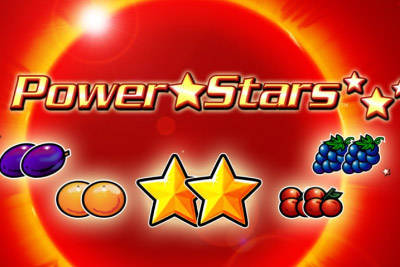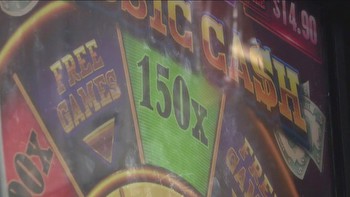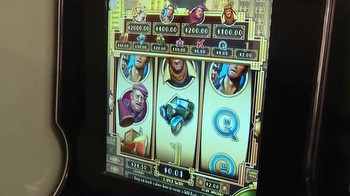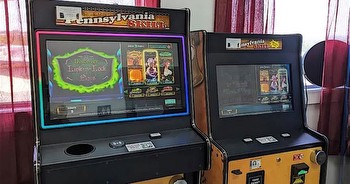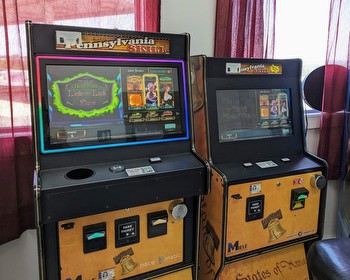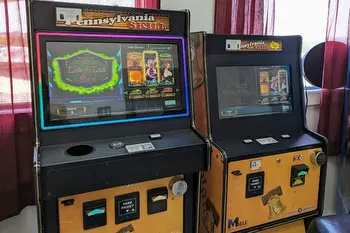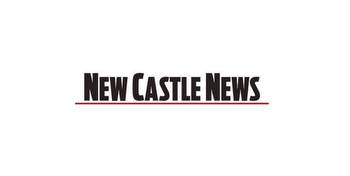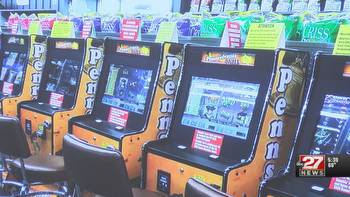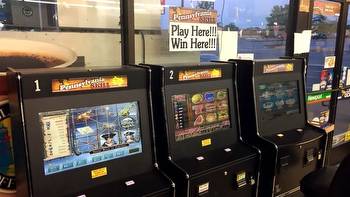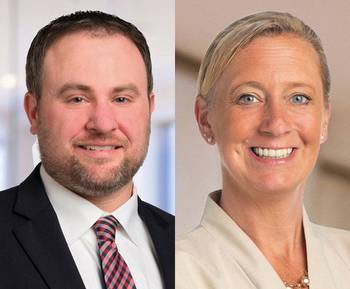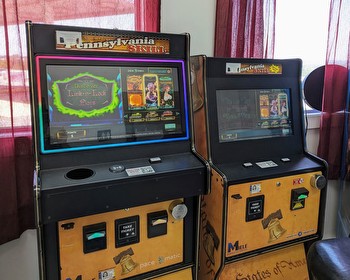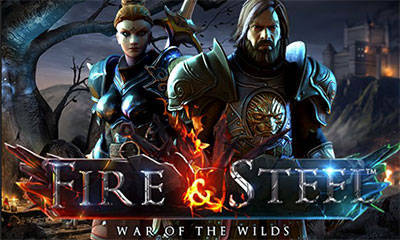Supporters of skill games in Pennsylvania receive major legal win

FROM OUR HARRISBURG NEWSROOM ON WHAT’S NEXT. HEY, TOM. YEAH, THIS RULING UPHELD A DAUPHIN COUNTY COURT DECISION DECLARING SKILL GAMING MACHINES WERE NOT SLOT MACHINES OR ILLEGAL GAMBLING DEVICES. EXPECT AN APPEAL FROM THE ATTORNEY GENERAL’S OFFICE TO THE STATE SUPREME COURT. BUT FOR NOW, THE DEVICES ARE BEING VIEWED AS GAMES OF SKILL, NOT CHANCE. ORDER A SANDWICH AT MOTHER SUBS IN HARRISBURG AND YOU CAN TRY TO WIN SOME MONEY ON A SKILL GAME WHILE YOU WAIT. CUSTOMERS. IT DOES. AND YOU CAN FIND THOSE GAMES AT RESTAURANTS, GAS STATION AND SOCIAL CLUBS OR FIRE HALLS, BUSINESSES AND ORGANIZATIONS RECEIVE A PORTION OF REVENUE FROM THE MACHINES WHICH ARE NOT SUBJECTED TO GAMING TAXES LIKE THE 54% TAX ON SLOT MACHINES FOUND IN CASINOS. MAKERS OF THE DEVICES SAY THE COURT DECISION CLEARS THE WAY FOR THE LEGISLATURE TO LIFT THE MACHINES OUT OF ANY LEGAL LIMBO. WE’RE IN A UNIQUE POSITION WHERE WE HAVE A LEGAL PRODUCT. THE COURT HAS SAID SO. AND WE’RE COMING TO THE STATE SAYING, PLEASE REGULATE US AND PLEASE, PLEASE TAX US. IT’S NOT SOMETHING VERY OFTEN HEARD IN HARRISBURG, BUT WE’RE HOPEFUL THAT WE’RE GOING TO GET SOME REAL ACTION, SOME WANT MORE PROTECTION FOR GAMERS, LIKE REQUIRING THE MACHINES LIST PHONE NUMBERS FOR RESOURCES TO HELP PEOPLE WHO STRUGGLE WITH COMPULSIVE GAMBLING. THE BOTTOM LINE IS, OUR CONCERN IS WE HAVE HUNDREDS OF CALLERS WHO ARE REACHING OUT TO US SAYING THAT SKILL MACHINES ARE THE MOST PROBLEMATIC TYPE OF GAMBLING, THAT THEY’RE STRUGGLING WITH. NOW, LEADERS WITH THE CASINO INDUSTRY AREN’T HAPPY WITH THE RULING EITHER, AND THEY WANT LAWMAKERS TO PASS LEGISLATION THAT WILL REMOVE WHAT THEY BELIEVE TO BE UNTAXED AND UNREGULATED GAMBLING DEVICES THAT SIPHON OFF MILLIONS OF DOLLARS
Commonwealth Court on Thursday upheld a lower court ruling deeming "skill games" played for monetary winnings to be legal, notching a major win for makers and operators of the devices that have become commonplace in Pennsylvania restaurants, bars, and gas stations.The 7-0 decision affirmed a Dauphin County court decision declaring the devices to not be slot machines or illegal gambling devices that could be seized by police because the games are based on hand-eye coordination rather than chance. A spokesman for the state attorney general's office indicated the decision is likely to be appealed to the Pennsylvania Supreme Court.But for now, the appellate court's decision means businesses and nonprofits can continue to offer customers a chance to play for money on the devices, which resemble slot machines found in casinos."It's perfectly legal and that's good," said Peter Lanfranca, who works at Mother's Subs in Harrisburg and believes the skill games there have brought in extra business and revenue.Though businesses earn income from the skill game devices, which have spread in appearance like wildfire across the state, the earnings are not subject to the same kind of gaming taxes that casinos must pay for slot machines.Leaders in the casino industry blasted the ruling and demanded lawmakers take action to prohibit what they say is simply unregulated and untaxed gambling that siphons millions of dollars from the $2.3 billion in gaming tax revenue generated by licensed casinos."This decision, if left unaddressed by lawmakers, will effectively open the floodgates for tens of thousands more ’skill’ games machines," said Pete Shelly, a spokesman for Pennsylvanians Against Gaming Expansion, a group lobbying against skill games created by casino industry leaders.Makers of the skill game machines viewed the ruling as a signal to lawmakers that it is now time to pass legislation formally regulating and taxing income from the games and settle the legal limbo surrounding the devices.Legislation has been proposed that would add limits to how many devices could be in one place, create fees for skill game manufacturers and operators, and set a 16 percent tax for the earnings. That figure falls much lower than the 54 percent tax on casino slot machines."We're in a unique position where we have a legal product — the court has said so — and we're saying, 'Please come tax us. Please come regulate us.' It's not something you hear very often in Harrisburg, but we're hoping to get some action," said Mike Barley, chief of public relations for skill game manufacturer Pace-O-Matic.Leaders with the Council on Compulsive Gambling of Pennsylvania have avoided weighing in on issue of skill games' legality. But the group's executive director, Josh Ercole, said they have urged state lawmakers to ensure the devices also feature ways to connect people who struggle with gaming or gambling addiction to resources that can help them — a feature he said is not currently found with skill game machines."Our concern is we have hundreds of people calling us telling us that skill machines are the hardest type of gambling they're struggling with," he said.
HARRISBURG, Pa. —Commonwealth Court on Thursday upheld a lower court ruling deeming "skill games" played for monetary winnings to be legal, notching a major win for makers and operators of the devices that have become commonplace in Pennsylvania restaurants, bars, and gas stations.
The 7-0 decision affirmed a Dauphin County court decision declaring the devices to not be slot machines or illegal gambling devices that could be seized by police because the games are based on hand-eye coordination rather than chance. A spokesman for the state attorney general's office indicated the decision is likely to be appealed to the Pennsylvania Supreme Court.
But for now, the appellate court's decision means businesses and nonprofits can continue to offer customers a chance to play for money on the devices, which resemble slot machines found in casinos.
"It's perfectly legal and that's good," said Peter Lanfranca, who works at Mother's Subs in Harrisburg and believes the skill games there have brought in extra business and revenue.
Though businesses earn income from the skill game devices, which have spread in appearance like wildfire across the state, the earnings are not subject to the same kind of gaming taxes that casinos must pay for slot machines.
Leaders in the casino industry blasted the ruling and demanded lawmakers take action to prohibit what they say is simply unregulated and untaxed gambling that siphons millions of dollars from the $2.3 billion in gaming tax revenue generated by licensed casinos.
"This decision, if left unaddressed by lawmakers, will effectively open the floodgates for tens of thousands more ’skill’ games machines," said Pete Shelly, a spokesman for Pennsylvanians Against Gaming Expansion, a group lobbying against skill games created by casino industry leaders.
Makers of the skill game machines viewed the ruling as a signal to lawmakers that it is now time to pass legislation formally regulating and taxing income from the games and settle the legal limbo surrounding the devices.
Legislation has been proposed that would add limits to how many devices could be in one place, create fees for skill game manufacturers and operators, and set a 16 percent tax for the earnings. That figure falls much lower than the 54 percent tax on casino slot machines.
"We're in a unique position where we have a legal product — the court has said so — and we're saying, 'Please come tax us. Please come regulate us.' It's not something you hear very often in Harrisburg, but we're hoping to get some action," said Mike Barley, chief of public relations for skill game manufacturer Pace-O-Matic.
Leaders with the Council on Compulsive Gambling of Pennsylvania have avoided weighing in on issue of skill games' legality.
But the group's executive director, Josh Ercole, said they have urged state lawmakers to ensure the devices also feature ways to connect people who struggle with gaming or gambling addiction to resources that can help them — a feature he said is not currently found with skill game machines.
"Our concern is we have hundreds of people calling us telling us that skill machines are the hardest type of gambling they're struggling with," he said.







